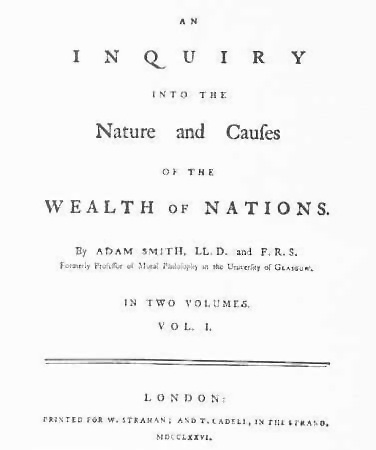
The Wealth of Nations
An Inquiry into the Nature and Causes of the Wealth of Nations, generally referred to by its shortened title The Wealth of Nations, is the magnum opus of the Scottish economist and moral philosopher Adam Smith (1723–1790). First published in 1776, the book offers one of the world's first connected accounts of what builds nations' wealth, and has become a fundamental work in classical economics. Reflecting upon economics at the beginning of the Industrial Revolution, Smith addresses topics such as the division of labour, productivity, and free markets.[1]
This article is about the book by Adam Smith. For data on the monetary wealth of countries, see List of countries by total wealth.Author
English
W. Strahan and T. Cadell, London
9 March 1776
Synopsis[edit]
Book I: Of the Causes of Improvement in the productive Powers of Labour[edit]
Of the Division of Labour: Division of labour has caused a greater increase in production than any other factor. This diversification is greatest for nations with more industry and improvement, and is responsible for "universal opulence" in those countries. This is in part due to increased quality of production, but more importantly because of increased efficiency of production, leading to a higher nominal output of units produced per time unit.[14] Agriculture is less amenable than manufacturing to division of labour; hence, rich nations are not so far ahead of poor nations in agriculture as in manufacturing.
Of the Principle which gives Occasion to the Division of Labour: Division of labour arises not from innate wisdom, but from humans' propensity to barter.
That the Division of Labour is Limited by the Extent of the Market: Limited opportunity for exchange discourages division of labour. Because "water-carriage" (i.e. transportation) extends the market, division of labour, with its improvements, comes earliest to cities near waterways. Civilization began around the highly navigable Mediterranean Sea.
Of the Origin and Use of Money: With division of labour, the produce of one's own labour can fill only a small part of one's needs. Different commodities have served as a common medium of exchange, but all nations have finally settled on metals, which are durable and divisible, for this purpose. Before coinage, people had to weigh and assay with each exchange, or risk "the grossest frauds and impositions." Thus nations began stamping metal, on one side only, to ascertain purity, or on all sides, to stipulate purity and amount. The quantity of real metal in coins has diminished, due to the "avarice and injustice of princes and sovereign states," enabling them to pay their debts in appearance only, and to the defraudment of creditors.
Of the Wages of Labour: In this section, Smith describes how the wages of labour are dictated primarily by the competition among labourers and masters. When labourers bid against one another for limited employment opportunities, the wages of labour collectively fall, whereas when employers compete against one another for limited supplies of labour, the wages of labour collectively rise. However, this process of competition is often circumvented by combinations among labourers and among masters. When labourers combine and no longer bid against one another, their wages rise, whereas when masters combine, wages fall. In Smith's day, organised labour was dealt with very harshly by the law.
Smith himself wrote about the "severity" of such laws against worker actions, and made a point to contrast the "clamour" of the "masters" against workers' associations, while associations and collusions of the masters "are never heard by the people" though such actions are "always" and "everywhere" taking place: